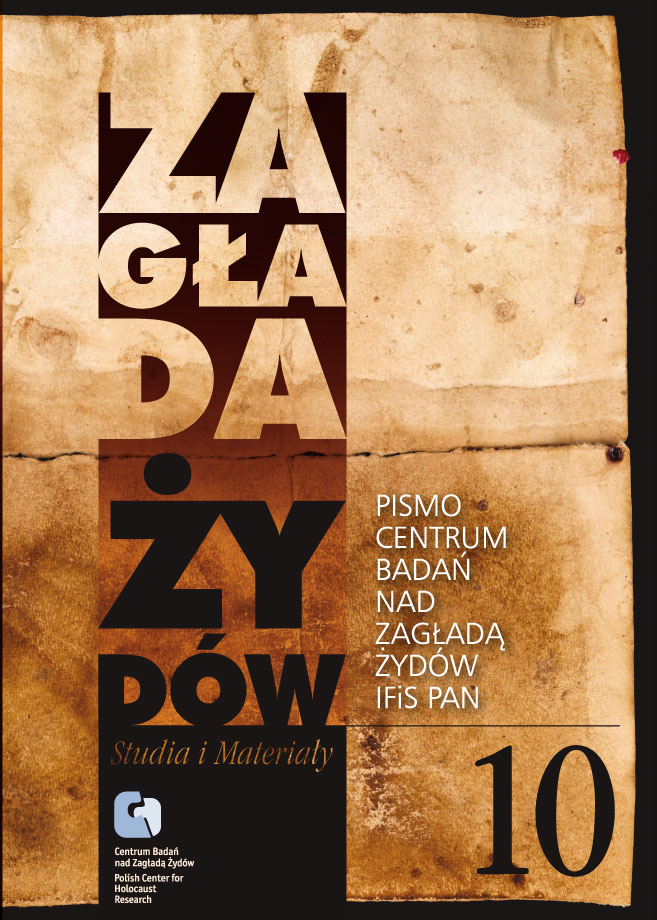Czy prawda nas wyzwoli? Przełamywanie oporu psychologicznego w przyjmowaniu wiedzy o Zagładzie
Zagłada Żydów. Studia i Materiały, Nr 10 (2014), Strony: 803-822
Data zgłoszenia: 2020-10-26Data publikacji: 2014-12-01
 https://doi.org/10.32927/ZZSiM.549
https://doi.org/10.32927/ZZSiM.549
Abstrakt
The introduction of the programs on Holocaust education in Poland and a broader debate on the transgressions of Poles against the Jews have not led to desired improvement in public knowledge on these historical events. A comparison of survey results from the last two decades (Bilewicz, Winiewski, Radzik, 2012) illustrates mounting ignorance: the number of Poles who acknowledge that the highest number of victims of the Nazi occupation period was Jewish systematically decreases, while the number of those who think that the highest number of victims of the wartime period was ethnically Polish, increases. Insights from the social psychological research allow to explain the psychological foundations of this resistance to acknowledge the facts about the Holocaust, and indicate the need for positive group identity as a crucial factor preventing people from recognizing such a threatening historical information. In this paper we will provide knowledge about the ways to overcome this resistance-through-denial. Implementation of such measures could allow people to accept responsibility for the misdeeds committed by their ancestors.
Słowa kluczowe
stosunki polsko-żydowskie , teoria tożsamości społecznej , opór psychologiczny
Licencja
Prawa autorskie (c) 2014 Autor&"Zagłada Żydów. Studia i Materiały"

Utwór dostępny jest na licencji Creative Commons Uznanie autorstwa 4.0 Międzynarodowe.
https://creativecommons.org/licenses/by/4.0
Czasopismo publikowane jest w standardzie Diamond Open Access na licencji CC-BY-4.0 Deed - Uznanie autorstwa 4.0 Międzynarodowa - Creative Commons
Inne teksty tego samego autora
- Michał Bilewicz, Nie tylko o „Strachu”. Psychologia potocznego rozumienia historii , Zagłada Żydów. Studia i Materiały: Nr 4 (2008)
- Michał Bilewicz, Karolina Marcinkowska, Społeczna psychologia Holokaustu: od naiwnego sytuacjonizmu do zrozumienia roli ideologii , Zagłada Żydów. Studia i Materiały: Nr 20 (2024)
Podobne artykuły
- Michał Bilewicz, Nie tylko o „Strachu”. Psychologia potocznego rozumienia historii , Zagłada Żydów. Studia i Materiały: Nr 4 (2008)
- Jerzy Tomaszewski, Jakub Petelewicz, Jak Polacy patrzyli na getto z zewnątrz z Jerzym Tomaszewskim rozmawia Jakub Petelewicz , Zagłada Żydów. Studia i Materiały: Nr 1 (2005)
- Małgorzata Melchior, Zagłada i stosunki polsko – żydowskie w opracowaniach socjologicznych. , Zagłada Żydów. Studia i Materiały: Nr 1 (2005)
- Jakub Petelewicz, „Kresy Wschodnie pod okupacją sowiecką 1939–1941; stosunki ukraińsko-polsko-żydowskie, życie społeczne i wzajemne relacje” , Zagłada Żydów. Studia i Materiały: Nr 3 (2007)
- Anna Zawadzka, Piotr Forecki, Reguła złotego środka. Kilka uwag na temat współczesnego dominującego dyskursu o „stosunkach polsko-żydowskich” , Zagłada Żydów. Studia i Materiały: Nr 11 (2015)
- Piotr Forecki, Anna Zawadzka, The Golden Mean Principle. A Handful of Comments on the Currently Dominant Discourse on ‘Polish-Jewish Relations’ , Zagłada Żydów. Studia i Materiały: Nr Holocaust Studies and Materials (2017)
- Martyna Grądzka-Rejak, Zoë Waxman, Kobiety Holocaustu , Zagłada Żydów. Studia i Materiały: Nr 16 (2020)
- Natalia Aleksiun, Polska i zagraniczna historiografia na temat stosunków polsko-żydowskich w okresie drugiej wojny światowej , Zagłada Żydów. Studia i Materiały: Nr 1 (2005)
- Alina Skibińska, Jakub Petelewicz, Udział Polaków w zbrodniach na Żydach na prowincji regionu Świętokrzyskiego , Zagłada Żydów. Studia i Materiały: Nr 1 (2005)
- Jan Olaszek, Żydzi i armia Andersa. Przypadek Romana Zimanda , Zagłada Żydów. Studia i Materiały: Nr 20 (2024)
1 2 3 4 5 6 7 8 9 10 11 12 13 14 15 16 17 18 19 20 21 22 23 24 25 26 27 28 > >>
Możesz również Rozpocznij zaawansowane wyszukiwanie podobieństw dla tego artykułu.
 English
English
 Język Polski
Język Polski



 https://orcid.org/0000-0001-5027-1691
https://orcid.org/0000-0001-5027-1691





